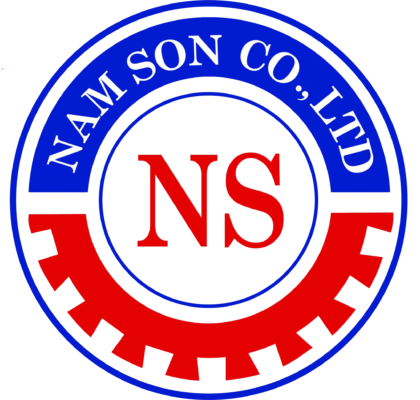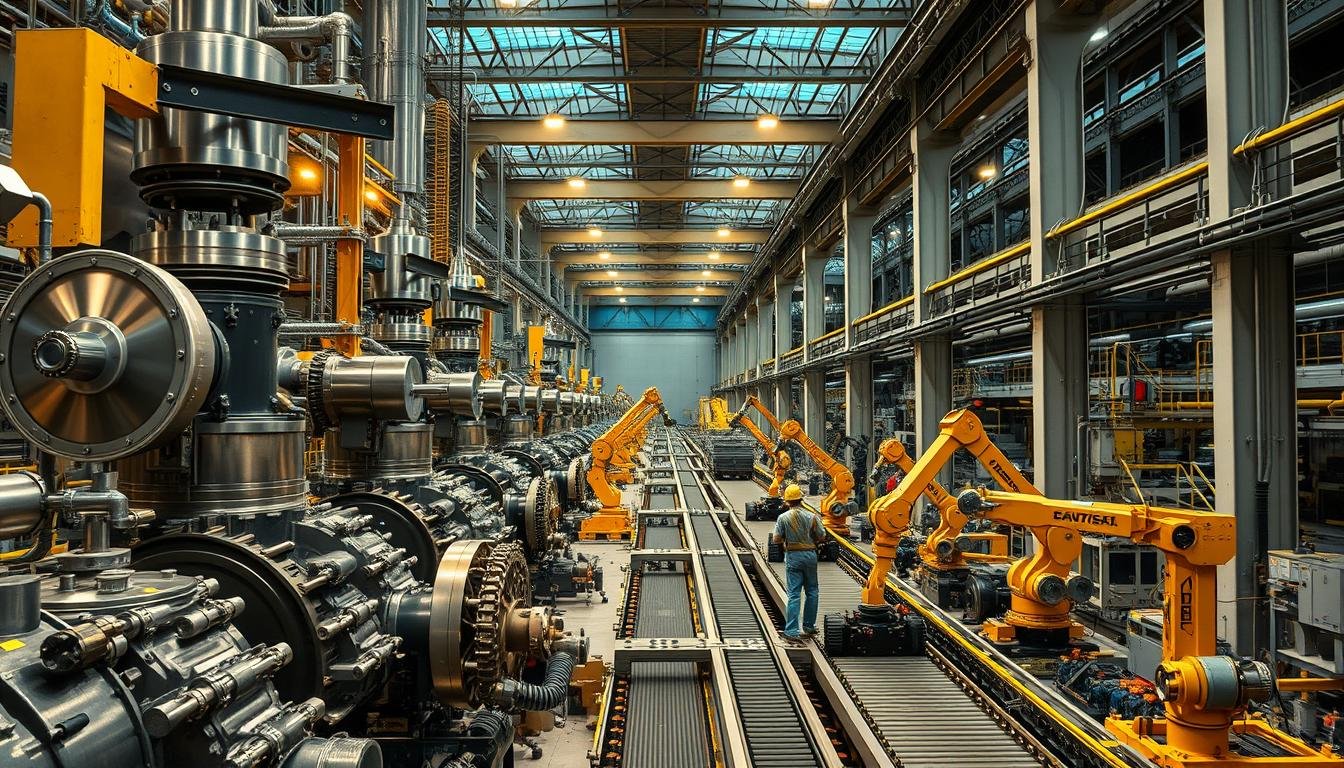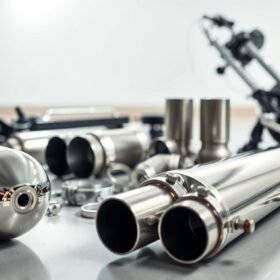Reliable Mechanical Processing for Your Business
In today’s fast-paced market, mechanical processing is key. It turns raw materials into top-notch products. Reliable methods ensure products are consistent, fast, and accurate, meeting customer needs.
Industrial solutions in mechanical processing help factories grow and stay competitive. They make it easier to scale up and keep ahead of the competition.
Using the latest technology in mechanical processing cuts down on downtime and mistakes. This lowers costs and increases production. Companies with the latest machinery and methods have a big advantage in quality and efficiency.
For manufacturers, investing in reliable mechanical processing is essential. It keeps them relevant and profitable in a competitive world.
Key Takeaways
- Efficient mechanical processing drives production scalability and cost reduction.
- Modern mechanical systems improve product precision and market competitiveness.
- Reliable manufacturing practices ensure consistent quality across all output.
- Industrial solutions in mechanical processing directly affect a factory’s operational success.
- Advanced technologies in this field are critical for long-term business growth.
Understanding Modern Mechanical Processing
Modern mechanical processing has changed manufacturing a lot. It uses industrial manufacturing evolution and mechanical factory technologies like robotics and AI. These new methods are more precise and can make more products, helping businesses meet global needs.
The Evolution of Mechanical Processing Technologies
At first, making things was done by hand and with simple machines. The 20th century introduced CNC machining and computers. Now, advanced processing systems use IoT sensors and analyze data in real-time. This makes work better and faster in many fields.
Core Components of an Effective Mechanical Processing System
- Hardware: CNC lathes, 3D printers, and robotic arms.
- Software: CAD/CAM programs for design and simulation.
- Control Systems: PLCs and SCADA for automation.
- Expertise: Trained engineers managing integrated tech ecosystems.
How Advanced Processing Differs from Traditional Methods
Old ways needed manual changes and took longer to set up. Now, advanced systems offer:
- Speed: Automated setups cut production time by 40%+.
- Accuracy: Micrometer-level precision for complex parts.
- Flexibility: Software updates adapt systems to new designs instantly.
Why Reliable Mechanical Processing Matters for Business Success
Reliable mechanical processing is key for modern manufacturing success. Companies focusing on this area see big improvements in business efficiency and manufacturing quality. For instance, they cut downtime by up to 40%, which boosts output and profits.
Unreliable systems harm mechanical factory operations in three main ways:
- More defects mean costly rework
- Delayed shipments hurt customer trust
- Higher energy use
These problems cut into profits and damage a brand’s image.
Data shows 82% of manufacturers report higher client retention after upgrading to reliable mechanical processing systems.
Car part makers cut warranty claims by 35% with advanced CNC machining. Medical device companies get to market 20% faster with consistent quality. These gains come from better production workflows.
Investing in reliable mechanical processing is more than buying machines. It’s a smart move for growth. By meeting quality standards like ISO 9001, companies get consistent results. This ensures they stay competitive in a tough global market.
Essential Mechanical Processing Services for Manufacturing Excellence
Manufacturing excellence relies on specialized services that transform raw materials into quality products. These services make production smoother, products more durable, and meet high standards. Here’s how key services lead to success:
Precision CNC Machining Services
CNC machining offers unmatched accuracy for complex parts. It uses techniques like turning, milling, and drilling on metals and plastics. Advanced CNC machining systems automate, cutting down on errors and increasing efficiency. For example, aerospace parts need these methods to be both light and strong.
- Turning: Creates cylindrical parts for engines and machinery
- Milling: Carves intricate 3D shapes in automotive molds
- Grinding: Achieves ultra-fine finishes for medical implants
Surface Treatment and Finishing Options
Surface treatments protect parts from corrosion and wear. Anodizing, painting, and surface treatments like electroplating improve both function and look. For instance, aerospace parts are heat-treated to handle extreme temperatures.
Assembly and Integration Services
Mechanical factory integration makes sure components work well together. Automated assembly lines use robots for precision. This cuts down on downtime and meets production goals. A leading automotive supplier cut assembly errors by 40% with these methods.
Quality Assurance Processes
“Quality is built in, not inspected in.” — John Taylor, Director of Manufacturing at Boeing
Statistical process control and non-destructive testing check every step. Quality assurance follows ISO and FDA standards. Regular audits find defects early.
Combining CNC machining, surface treatments, and mechanical factory integration makes a strong production line. These services ensure products meet exact specs, cut costs, and reduce lead times. Manufacturers focusing on these areas stay ahead in global markets.
Optimizing Your Mechanical Factory Operations
To boost productivity in mechanical factories, a clear plan is needed. This plan focuses on three main areas: improving workflows, keeping equipment in top shape, and training staff. Each area plays a big role in making things run smoothly and efficiently.

Workflow Analysis and Improvement
Looking into workflows helps find what’s holding things back. Methods like value stream mapping and lean manufacturing help spot these issues. For instance:
- Time studies track cycle times for machining processes
- Value stream mapping highlights material flow gaps
- Data logging systems monitor machine utilization rates
By using these tools, factories can see their production speed go up by 25%.
Equipment Maintenance and Reliability Programs
Using predictive maintenance can make equipment last longer and reduce downtime. Let’s compare different methods:
| Type | Predictive | Preventive |
|---|---|---|
| Usage | Sensor-based monitoring | Scheduled checkups |
| Costs | Higher initial investment | Lower upfront costs |
| Effectiveness | Reduces unexpected failures | Averts gradual wear issues |
Staff Training and Skill Development
Training programs are key to improving staff skills. Important steps include:
- Certification courses in CNC programming
- Cross-training between machining and quality control roles
- Monthly safety and best-practice workshops
Companies that invest in training see a 30% drop in operator mistakes each year.
Cost-Effective Solutions for Scaling Your Production Capacity
Scaling production needs careful planning to grow without spending too much. Companies achieve manufacturing scalability by making the most of their machines and using cost-effective mechanical processing methods. They focus on scaling production wisely, choosing smart upgrades and flexible systems.
- Equipment efficiency: Boost output with predictive maintenance and smart scheduling to cut downtime.
- Automation integration: Use robotic systems from brands like FANUC or ABB to save on labor and improve precision.
- Modular expansions: Invest in scalable floor layouts for easy mechanical factory expansion without big retooling costs.
Leaders who focus on ROI look at long-term savings from scalable solutions. They consider leasing equipment or working with suppliers like Siemens for modular machinery. This approach lowers the initial costs. Data shows companies that expand in phases save 30% on capital compared to sudden overhauls.
“Scalability isn’t just about size—it’s about aligning growth with market demands without straining cash flow,” emphasizes a 2023 report by Deloitte.
To keep quality up during scaling, use tools like those from Rockwell Automation for real-time monitoring. Regular audits help keep output consistent as it grows. By mixing incremental upgrades with strategic partnerships, manufacturers can grow without overextending themselves.
Industry-Specific Mechanical Processing Applications
Manufacturing sectors need special mechanical solutions. These meet unique technical and regulatory demands. Precision and compliance shape every industry’s production processes. Here’s how mechanical processing adapts to four key markets:

“Customized machining ensures components meet industry-specific safety and performance benchmarks.” – 2023 Advanced Manufacturing Trends Report
Aerospace and Defense Requirements
Aerospace mechanical processing involves machining exotic metals like Inconel and titanium. Defense contractors use five-axis CNC mills to make turbine blades that can handle extreme temperatures. FAA certification requires zero defects in parts like aircraft landing gear, driving the adoption of real-time quality monitoring systems.
Automotive Industry Solutions
Automotive manufacturing focuses on high-volume automotive manufacturing of lightweight materials. Electric vehicle frames made from aluminum alloys reduce emissions. Robotic welding ensures consistent body panels. Suppliers like Magna use modular production lines to shift between gas and electric vehicle components.
Medical Device Manufacturing
In medical device production, ISO 13485 compliance mandates sterilized environments. Surgical tools are laser-cut from stainless steel under cleanroom conditions. Traceability systems log every machining step to satisfy FDA requirements, ensuring recalls can be tracked to specific production batches.
Consumer Products and General Manufacturing
Consumer goods benefit from mechanical factory specialization. Electronics makers like Apple use quick-change tooling to produce smartphone cases in weeks instead of months. Injection molding lines for plastic toys adjust rapidly between seasonal designs, minimizing downtime.
Selecting the Right Mechanical Processing Partner
Choosing the right mechanical processing partner is crucial. You need to look at their credentials, what they can do, and their reputation. This guide will help you find the right fit for your business.
Essential Qualifications and Certifications
Make sure they have the right manufacturing certifications. Look for:
- Accreditation for industry-specific standards
- Regular third-party audit results
- Environmental compliance documentation
Evaluating Technical Capabilities and Equipment
Check their equipment evaluation by looking at these factors:
| Criteria | Evaluation Factors | Impact |
|---|---|---|
| Machinery | CNC machining precision, tooling inventory | Directly affects production quality |
| Technology | Automation levels, software integration | Ensures scalability |
| Facility | Production capacity, floor space | Avoids bottlenecks |
Assessing Track Record and Client Testimonials
Look at their past performance by:
- Case studies from similar projects
- Talking to past clients
- Checking their project portfolios online
Choose a mechanical factory that fits your needs and goals.
Future Trends in Mechanical Processing Technology
Manufacturing technology is changing fast. Industry 4.0 is leading this change. It combines smart systems like IoT sensors and real-time data analytics to make production better.
Factories use these tools to predict when equipment might fail. This helps them improve product quality. It also cuts downtime and costs.
- Collaborative robots (cobots) work alongside humans, enhancing precision without replacing jobs.
- Energy-efficient machinery and recycling systems reduce waste, aligning with sustainability goals.
- Virtual digital twins simulate processes to test adjustments before real-world implementation.
New materials like composites and advanced alloys need new ways to process them. Companies that adopt these innovations stay ahead. They focus on finding a balance between mechanical factory innovation and getting a good return on investment.
For example, tools from Siemens or Bosch help choose upgrades that increase output. This is key for success.
“The next decade will reward factories that blend automation with human expertise,” says a 2023 McKinsey report on manufacturing efficiency. “Adopting smart systems isn’t optional—it’s a pathway to staying competitive.”
Companies need to pick the right technologies for their goals. AI systems improve accuracy but need skilled people to manage them. Training and partnerships with tech providers are crucial for a smooth transition.
As automation grows, the focus is on sustainable, scalable solutions. These solutions turn data into useful insights.
Conclusion: Transforming Your Business Through Advanced Mechanical Processing
Advanced mechanical processing is more than just a technical step. It’s a key strategy for changing your business. Companies that focus on top-notch manufacturing with the latest tech get ahead. They use precision CNC machining, quality checks, and custom solutions to boost productivity and product quality.
Making your factory more efficient meets market needs. This is true for industries like aerospace, automotive, and medical devices. Using these methods helps follow rules, cuts down on downtime, and grows your business. A trusted partner with the right certifications can help you meet industry standards.
Changing your business starts with looking at your current processes. Check your mechanical processing, maintenance, and supplier relationships. Choose technologies that offer flexibility and precision. This way, mechanical processing becomes a driver for innovation, customer happiness, and profit. Start your journey to modern manufacturing excellence now.



Leave a Reply
Want to join the discussion?Feel free to contribute!